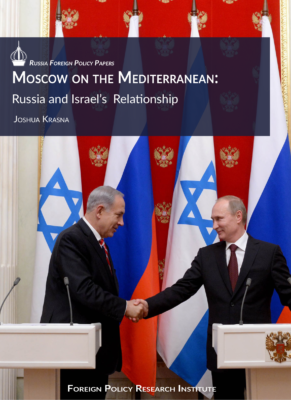A nation must think before it acts.
Executive Summary
The ties between Russia and Israel have evolved as both states developed their individual post-Cold War strategic views and policies. The steady progress that has been made since the restoration of diplomatic relations in 1991—and particularly since Vladimir Putin assumed office in 2000—represents a significant improvement in Israel’s national security environment and an important gain for Russia’s global and regional policy. Bilateral relations are the best they have been since 1991, and perhaps ever.
Since Russia’s 2015 intervention in Syria, each side sees the other as a major player in the region, with the capacity to affect its national security interests. The interests of the two states are only rarely identical, but often are in sync. Even in cases where they are opposed, both sides recognize the importance of the other and make significant efforts to deconflict. As a strong regional power, Israel has the capability to disrupt Moscow’s planned strategic architecture in the Middle East. On the other hand, Russia is closely aligned with Israel’s main rivals in the region, Iran and Syria, and today de facto shares a border with Israel on the Golan Heights; the presence of Russian forces provides a complication and a brake for Israeli activity. Israel hopes that Moscow can restrain its regional clients when their actions threaten its interests.
Russia has increased its footprint in the Middle East by not only developing ties with each major player, but more importantly, by negotiating the divides between them. Having good relations with nearly all of the Middle East’s feuding actors—a feat the United States cannot claim—Russia positions itself as the “indispensable middleman.” Israel, as a small, internationally isolated state, historically has sought good relations with any willing partner. Israel’s foreign policy aims to achieve maximum diversity in diplomatic relationships.
Historical, cultural, and social ties play a role in the Russia-Israel relationship, and there are several key strategic issues on which the two parties disagree. The most significant of these concern Iran, Syria, and Palestine.
Relations between Russia and Iran—especially in military and nuclear spheres—have been a key subject of diplomatic discourse between Jerusalem and Moscow for many years. Russia does not see positive relations with both Israel and Iran as antithetical. Rather, its regional strategy is premised on concurrently fostering beneficial ties with the two strongest powers in the region.
The bilateral relationship unfolds within a defined framework, the boundaries of which are well understood by both sides. It does not seem that the underlying interests that define the dynamics of the bilateral relationship will change significantly. Russia-Israel relations will continue to be characterized by a dichotomy of friendly relations coupled with serious disagreements on many regional issues.





